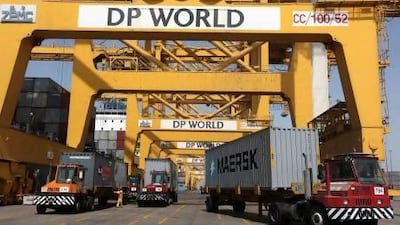Improved margins and cost controls lifted profits at DP World, the UAE-based global ports operator, in the first half of this year despite challenging economic conditions in world markets.
Financial results for the first half, announced yesterday, showed a 9.1 per cent rise in net profits, against the background of a 5.8 per cent decline in volumes of goods at its 65 marine terminals from Sydney, Australia to Santos, Brazil.
The chairman, Sultan Ahmed bin Sulayem, said the figures represented "another strong set of results in spite of challenging market conditions". He added that conditions had improved in the second quarter and said he was optimistic that trend would continue for the rest of the year.
Mr bin Sulayem said the company had no special contingency plans in place to deal with any economic repercussions of escalating regional conflict as a result of the Syria crisis. "It would not affect us. It [regional conflict] has happened in the past and we are well diversified everywhere in the world."
He said "robust" markets in the Middle East, Africa, Latin America and Australia had offset some weakness in Europe and in Asia. "India and China saw some slowdown in GDP growth," he added.
Revenues slipped by 1.3 per cent to US$1.51 billion, but operating profit rose 6.3 per cent to $278 million. The company's owners - its shares are ultimately held 80 per cent by the government-owned conglomerate Dubai World - benefited from a one-off financial injection of $158m from the restructuring of assets in Hong Kong.
In the period, DP World sold some smaller port businesses and "monetised" others via joint venture deals with trade partners.
The company also released "like-for-like" figures for the six months, showing results on the basis of ongoing businesses. These showed a 21.9 per cent surge in profits to $295m.
The chief executive Mohammed Sharaf said the result was "pleasing given some of the headwind we have faced".
DP World said it was committed to capital investment of $3.7bn until 2015, generated by cash flow and external financing.
"Our substantial investment programme remains unchanged and on schedule as we expect to add 10 million 20-foot equivalent units [TEUs or standard container units] of capacity over the next two years.
"Crucially our balance sheet remains strong, which gives us the ability to invest in the future growth of our current portfolio, and the flexibility to make new investments should the right opportunities arise as well as delivering enhanced returns to shareholders over the medium term," Mr Sharaf said.
About $544m was invested across the portfolio in the first half, with 1 million of extra TEU capacity at the flagship port in Jebel Ali. Operations at Embraport in Brazil and at the London Gateway site remain on track to open later this year.
Mr Sharaf said the Asia Pacific and India regions reported softer revenue due to a combination of challenging market conditions, a strategic focus on higher-margin containers and unfavourable currency movement. He said the recent decline in the value of the Indian rupee was not necessarily unfavourable for DP World as its tariffs in India were set in US dollars while much of its expenditure was in local currency.
"The operating environment remains challenging but the strong momentum of the second quarter gives us confidence for the rest of the year. Historically our second half has been stronger than the first and we expect volumes to show improvement in the second half of the year," he said.
The shares ended the day unchanged at $15.50 on the Nasdaq Dubai market. On the London Stock Exchange, where they are also traded, they edged up 1.27 per cent to £10 (Dh56.9).
The results beat many analysts' expectations. Georgy Ivanin, the Middle East equity analyst at Deutsche Bank, said it was a strong set of results despite the weaker volumes, and highlighted DP World's "strong cash generation and balance sheet".
Roger Elliott, an analyst at Citygroup in London, restated the company's standing as a "buy" stock and set a target price of $18.59.

